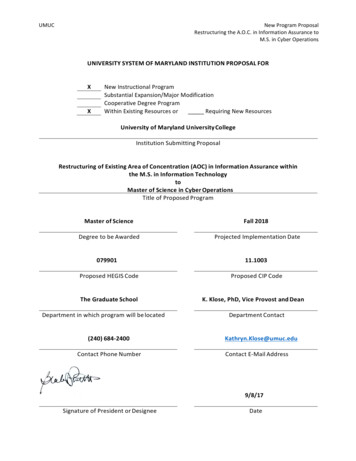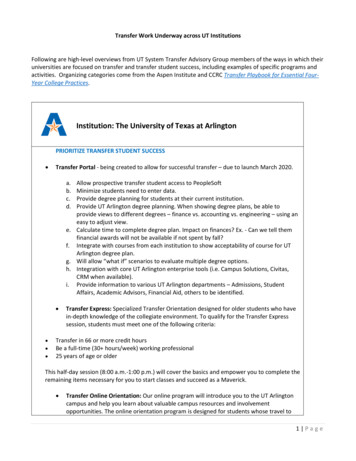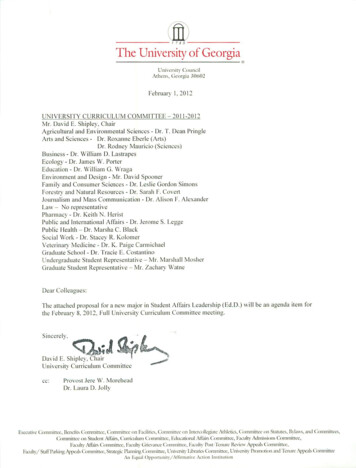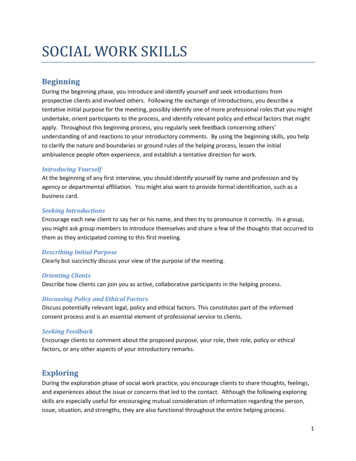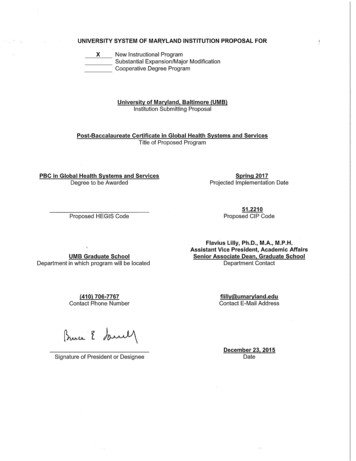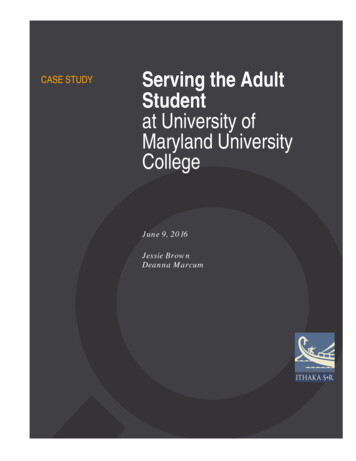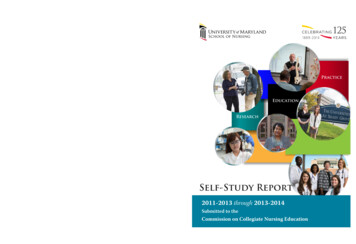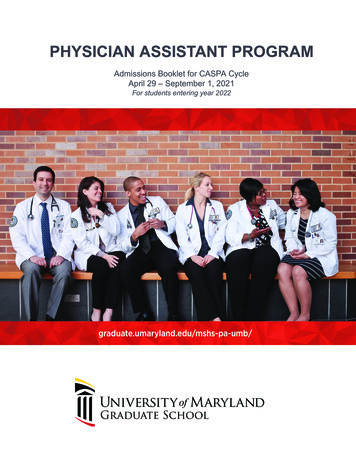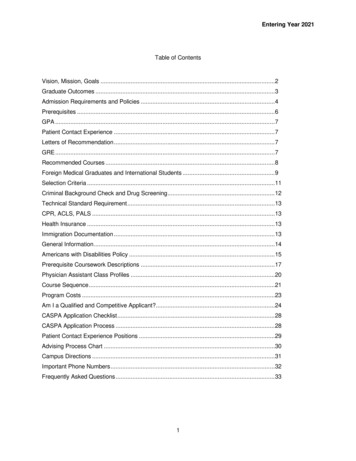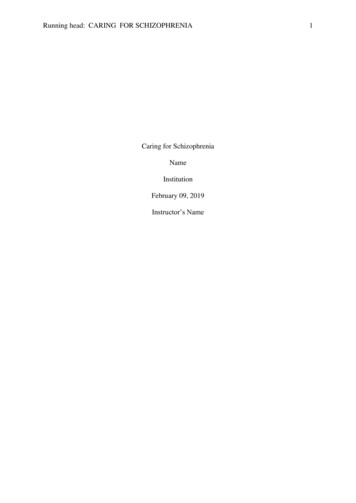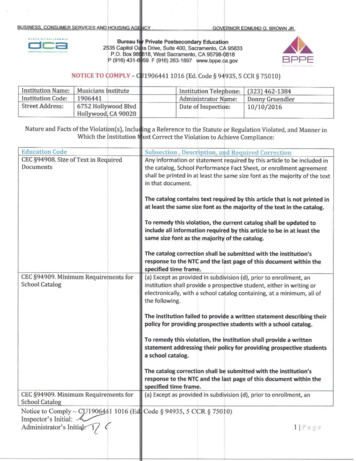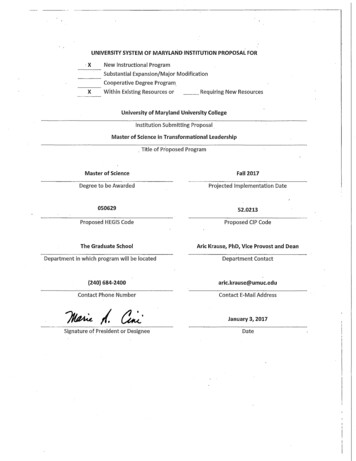
Transcription
UNIVERSITY SYSTEM OF MARYLAND INSTITUTION PROPOSAL FOR·XNew Instructional Program---Substantial Expansion/Major ModificationCooperative Degree Program.---xWithin Existing Resources orRequiring New ResourcesUniversity of Maryland University CollegeInstitution Submitting Proposal.Master of Science in Transformational Leadership. Title of Pr.oposed ProgramMaster of ScienceFall 2017Degree to be AwardedProjected Implementation Date05062952.0213Proposed HEGIS CodeProposed CIP CodeThe Graduate SchoolArie Krause, PhD, Vice Provost and DeanDepartment in which program will be locatedDepartment Contact(240) 684-2400aric.krause@umuc.edu.Contact Phone NumberContact E-Mail AddressJanuary 3, 2017Signature of President or DesigneeDate
New Instructional ProgramMaster of Science in Transformational LeadershipUMUCUniversity of Maryland University CollegeMaster of Science in Transformational LeadershipUniversity of Maryland University College (UMUC} proposes to offer a new instructional pro ram at themaster's degree level: the Master of Science (M.S.) in Transformational Leadership (HEGIS 050629; CIP52.0213). The M.S. in Transformational Leadership is designed for students with military managementexperience who wish to build upon and maximize their leadership training and skills in order totransition to business, non-profit, or government organizations. This M.S. program will require thesuccessful completion of six six-credit courses for a total of 36 semester hours of graduate-levelcoursework.A. Centrality to Institutional Missiol) Statement and Planning Priorities1.Program description and alignment with missionConsistent with the institutional purpose as stipulated by State statute (Md. Education CodeAnn. § 13-101(2012)), the mission of UMUC is improving the lives of adult learners. UMUC willaccomplish this by:(1) Operating as Maryland's open university, serving worl ing adults, military servicemenand servicewomen and their families, and veterans who reside in Maryland, across theUnited.States, and around the world;(2) Providing our students with affordable, open access to valued, quality higher education;and(3) Serving as a recognized leader in career-relevant education, embracing innovation andchange aligned with our purpose and sharing our perspectives and expertise.The Master Science in Transformational Leadership is designed for individuals with militarymanagement experience who wish to leverage and further their leadership training and skills inorder to transition out of the military and into careers in business, non-profit, or governmentorganizations. The program was constructed with an eye toward augmenting leadershipcompetencies that were. developed in the military and applying them to leadership in non military organizations. UMUC serves thousands of military students - both overseas through ourcontracts in Asia and Europe as well as military personnel in the U.S.:Fall 2015 UMUC worldwide active duty military headcount: 18,731 (33%)Fall 2015 UMUC worldwide veteran headcount: 10,562 (19%)1With drawdowns in the military, the curriculum is specifically designed to help separatingpersonnel transition to jobs in the private, public and non-profit s'ectors while leveraging theirmilitary experience and commensurate skills. This program presents an opportunity for these1Source: UMUC Office of Acc;reditation, Compliance and Reporting, October 20162
UMUCNew Instructional ProgramMaster of Science in Transformational Leadershipactive duty military students to strengthen their leadership competencies and develop theexpertise that companies expect of their leaders - the ability to effect and lead change, coachand manage performance, understand and develop financial goals and outcomes, foster a .culture of diversity and inclusion, and inspire leadership qualities in those they lead.Additionally, students in this program will hone skills that are necessary to communicatepersuasively, think creatively, manage change, and produce results through innovative andstrategic decisions that can transition to a public, private, and non-profit organization, as well asglobal business environments. The coursework will guide students through industry-relevantsimulations and collaborative projects to acquire job-ready knowledge and the competenceneeded for leaders who can meet the demands of transforming and leading organizations andpeople through complex business scenarios.2.Alignment with institutional strategic goalsAs the public state and national leader in distance and distributed education, UMUC awardsassociate's, bachelor's, master's and doctoral degrees, as well as undergraduate and post baccalaureate certificates. The university's academic inventory offers programs that are core toany public university, but UMUC's mission to the adult student results in an emphasis onworkforce relevant programs. Consequently, the university awards degrees and certificates inthe arts and humanities, behavioral and social sciences, business and management, health related fields, computing, education and technology, including degrees in fields facing criticalshortages, such as cybersecurity, information assurance and graduate-level teacher training inSTEM areas. As part of its emphasis on workforce needs, UMUC offers non-credit professionaldevelopment programs such as those in executive leadership and hosts professionalconferences and meetings that support the economic and societal needs of the State.Providing career relevant programs to the men and women of the military is a key part ofUMUC's strategic goals. UMUC first began serving military students as a core constituency in1949 when it won the contracts to provide on the ground classes to personnel stationed inEurope and Asia. It has continued to hold these contracts to provide education in Europe andAsia to the present day. UMUC also serves substantial numbers of military students andveterans in the United States as well. UMUC's mission itself recognizes that serving the militarycommunity is core to UMUC's purpose.This proposed degree program aligns with UMUC's mission by constructing a creative newprogram that will serve as a bridge for military personnel transitioning to the private economy.Military service provides many opportunities to gain competencies in leadership andmanagement but those competencies need to be augmented and adapted to be useful in a non military context. In creating this program, UMUC is strategically serving the needs of its militarystudents that are so closely tied to the institution's history and mission.3
UMUCNew Instructional ProgramMaster of Science in Transformational LeadershipThis proposal aligns with UMUC's mission by providing a learner-focused program based onleading-edge adult learning theory and curriculum design that aligns with the needs of studentsand the community. The program is consistent with UMUC's commitment to offering currentand relevant degrees that prepare students for the workforce. Students are given time topractice skills as they progress through formati've instruction. The program will supportstudents' professional development with opportunities to learn from employers and peers. Theprogram model offers flexibility and continuing education and social opportunities to adultsinterested in refreshing and reshaping their career opportunities.B. Adequacy of Curriculum Design and Delivery to Related Learning Outcomes1.Program requirementsThis program will incorporate teaching, learning, and assessment strategies that focus onstudents' development of concrete, job-related knowledge and skills. The curriculum is based onprinciples of competency- and performance-based learning and is designed to augmentstudents' leadership experience and training. The required competencies comprising theprogram learning outcomes have been developed and verified with the help of militaryrepresentatives, academic experts, and employers to create a curriculum and assessments toprepare students to transition from mid-level to senior l adership roles. The approach islearner-focused and authentic assessments are embedded in every step of the learning process.Through embedded assessments (referred to as projects), students perform real-worldauthentic tasks that guide and support them, and that require them to demonstrate theirknowledge and skills as they work toward mastery of leadership competencies. Students "learnby doing" and graduate better prepared for workplace opportunities.Foundational to the program is a first course that covers essential intra- and interpersonalcompetencies required for successful graduate work and identified by employers as essential forsuccess in today's workplace nd global business community. This course addresses the corecompetencies of written and oral communications, critical thinking, quantitative reasoning andleadership. Five additional 6-credit courses build on the foundation and guide students throughindividual and collaborative projects centered in transformational leadership content that willprepare students to lead and effect change at the individual, group, and organization levels.As shown below, the M.S. in Transformational Leadership will require the completion of six 6 credit courses for a total of 36 credits, including the 6-credit foundational course that is requiredfor all graduate students. Students entering the program will have approximately ten years ofverifiable leadership experience acquired from a combination of military duty and training.Professional experience and/or prior graduate-level work may be eligible to receive transfercredit for prior leadership experience and education, to be evaluated on an individual basis.Course descriptions are presented in the Appendix.4
UMUCNew Instructional ProgramMaster of Science in Transformational LeadershipRequired Courses for the M.S. in Transformational Leadership (TLP):2. DCL 600 Decisive Thinking, Communicating, and Leading (6) TLP 610 Becoming a Leader (6) TLP 620 Leading in the Organization (6) TLP 630 Leading with Strategy and Performance Measures (6) TLP 640 Leading through Change and Uncertainty (6) TLP 650 Leadership Capstone (6)Educational objectives and student learning outcomesThrough completion of the foundational course (DCL 600), students who complete the M.S. inTransformational Leadership will be able to: Communicate clearly both orally and in writing. Apply logical processes to formulate clear, defensible ideas and to draw conclusions basedon the consideration of ethical implications. Use mathematical information, operations and quantitative analyses to solve problems andinform decision-making. Lead, facilitate, and collaborate with a variety of individuals and diverse teams to achieveorganizational objectives.Through completion of the sequential TLP courses, students who complete the M.S. inTransformational Leadership will be able to:Articulate a personalized vision for leadership development and continual learning. Define and draw on a set of ethical and moral standards as a leade.r and a representative forthe organization's brand, its employees, and constituents. Employ a variety of specific skills appropriate for engaging with multigenerational, diverseindividuals and work groups representing all professional levels. Apply techniques that demonstrate an understanding of financial management and dataanalytics that drive organization and business performance and decisions. Apply approaches for integrating and leading ch.ange at the organization, group, andindividual levels. Demonstrate skills in negotiation, conflict resolution, handling crisis situations, andunplanned events. 3.Identify and evaluate technology tools for engaging individuals and projects.General education requirementsNot applicable.5
New Instructional ProgramMaster of Sdence in Transformational LeadershipUMUC4.Specialized accreditation or graduate certification requirementsNot applicable.5.Contractual agreement with other institutionsNot applicable.C. Critical and Compelling Regional or Statewide Need as Identified in the State Plan1.Demand and need for the programThe need for the M.S. in Transformational Leadership is clear from the number of militarypersonnel who have been and have yet to be downsized from the various services. In 2015, the2Army announced that they would be cutting 40,000 troops In March of 2016 alone, 2,6003soldiers departed active service. The Navy also will be cutting thousands of positions4 Inaddition to involuntary separations, there are voluntary separations as well. The M.S. inTransformational Leadership will enable the transition of military personnel into capable leaderswho can fill much needed positions in the private, non-profit and. public sectors. In Marylandspecifically, there js a potential market of 522,840 comprjsed of managers in the private andpublic sectors as well as military personnel5 2Source: Army plans to cut 40,000 troops, USA Today (July 8, 2015),http://www. usatoday. com/story/news/nation/2015/07/07/army-pla ns-toccut-40000-troops/29826423/3Source: Army Shrinks to Smallest Level Since World War II, Army Times (May 7, 2016),https :ljwww.armytimes.com/storv/m ilitarv/ ca reers/armv/2016/05/07 /army-sh rinks-smallest-I evel-since-before-world-war ii/83875962/4Source: Thousands of Navy jobs to be cut in fiscal 2017, sources say, Navy Times (February 8, ces/80013688/5Source: U.S. Census Bureau, 2010-2014 American Community Survey 5-Year Estimates6
UMUCNew Instructional ProgramMaster of Science in Transformational LeadershipSource: U.S. Census Bureau, 2010-2014 American Community Survey 5-Year EstimatesDemand is high in Maryland for candidates to fill the kinds of managerial and leadershippositions that graduates of this program will be prepared to assume. According to Burning GlassLabor Insight, the number of job postings in the last 12 months for Management positions inMaryland is approximately 55,000. Forty-five percent of those job openings required aBachelor's degree, while 17% of those jobs required a Master's degree. There will also bedemand from the organizations that already employ these graduates, allowing them to hire andpromote from within.Number ofjob postings in the last 12 months(Based on O*NETJob Family for "Management")54,9932.Consistency with the Maryland State Plan for Post-Secondary Education7
UMUCNew Instructional ProgramMaster of Science In Transformational LeadershipThe proposed program is designed to meet present and future needs of the state, as identifiedin Maryland Ready: The 2013-2017 Maryland State Plan for Post-Secondary Education {StatePlan). This program supports major goals in the State Plan in a number of specific and concrete. The program serves Goals 1 and 2 (Quality· and ·Effectiveness' and Access, Affordability andCompletioni in the State Plan in that it is designed to support UMUC's overall mission to seta global standard for excellence and to be respected as a leader for aff rdable andaccessible adult education programs. In addition, UMUC administers its programs to meetthe goals of the Effectiveness and Efficiency Initiative of the University System of MarylandBoard of Regents, by employing data-driven decision-making that ensures that academicprograms offer high-quality education at an affordable cost to broaden access. The program supports Goal. 3 (Diversity) in the State Plan by offering access to education todiverse populations of students. As shown in Table 1 below, in 2015-2016, UMUC awarded35% of its master's degrees to African-American students and 6% to Hispanic students,compared to 18% and 4%, respectively, for Maryland institutions as a whole. UMUC iscommitted to maintaining its position in serving the educational needs of minority andmilitary students. Black/African American Students18%35%Hispanic/Latino Students4%6%.The program serves Goal 4 (Innovation) in the State Plan, as it is based on principles ofcompetency- and performance-based learning that are on the forefront of developments inhigher education. Competency-based learning is an outcomes-based approach to educationthat emphasizes what students should know and be able to do to be successful in theirdisciplines. The approach is learner-focused and assessment (measuring what the studenthas learned) is embedded in every step of the learning process to assist students in buildingreal-world job-relevant competencies in real-time. The proposed program will employauthentic assessments, called projects, that are relevant to tasks graduates will actuallyperform on the job; such projects will serve as both the means of instruction andassessment of learning in the program. Enhanced learning resources and multiple means forsupporting students as they progress through their learning experiences are being6Sources: 2016 MHEC DataBook, search/AnnualPublications/2016Databook.pdf; UMUC FY FactBook (FY 2015 Degree Data): e-factbook.cfm8
UMUCNew Instructional ProgramMaster of Science in Transformational Leadershipdeveloped toward the goal of improving retention and student success. The methodologyand the on-demand nature of the support are innovative in the field of higher education andonline learning. The program serves Goal 5 (Economic Growth and Vitality) in the State Plan, in that it isdesigned to better align tf:ie competencies and skills of graduates to the needs of industryand employers. In developing the program, program administrators met with militaryrepresentatives, employers and other experts to determine the competencies and skillsdesired in the workplace. This work resulted in a specific set of competencies for the degreeprogram upon which learning outcomes and projects (authentic assessments) weredeveloped. Students will be evaluated based on their mastery of learning demonstrations.The Graduate School also conducted focus groups with employers to identify thecompetencies expected of those in leadership positions, and intra- and interpersonalprofessional skills most desired in today's graduates and incorporated development of theseskills into the curricula. These efforts promise closer alignment of graduate skills anddispositions (attitudes) to employer needs than under prior learning models. The program serves Goal 6 (Data Use and Distribution) in the State Plan. The developmentof the program toward a competency-based learning methodology places more emphasison the monitoring of student and program progress across skills. Student performance·'willbe monitored via well-vetted competency rubrics capable of reporting on areas ofexcellence and needs for improvement. Aggregated data can be used to inform short- andlong-term improvement plans for students, programs and policies. Robust data systems willoffer insights that may assist in identifying populations that need additional support and inclosing achievement gaps for populations that require additional support.D. Quantifiable and Reliable Evidence and Documentation of Market Supply & Demand in theRegion and State1.Market DemandTable 2 below shows the employment outlook in Maryland for graduates of programs in fieldsaligned with the proposed program. The projected demand shown in Table 3 is drawn frbm theMaryland Department of Labor, Licensing, and Regulation (DLLR) employment projections for2014-2024 and is based on the crosswalk of the Transformational Leadership program'sproposed CIP code (52.0213 - Organizational Leadership) and the Bureau of Labor Statistics'Standard Occupational Codes (SOC). The definition of "total openings" as provided by DLLR is".the estimate of the number of jobs that will arise from the need to replace workers who will die,.retire, .or permanently leave the occupation for other reasons over the projection period." 77Source: Maryland D
Jan 03, 2017 · University_ of Maryland University College (UMUC} proposes to offer a new instructional . pro ram . at the . The curriculum is based on . principles of competency-and performance-based learning and is designed to augment . students' leadership experien
